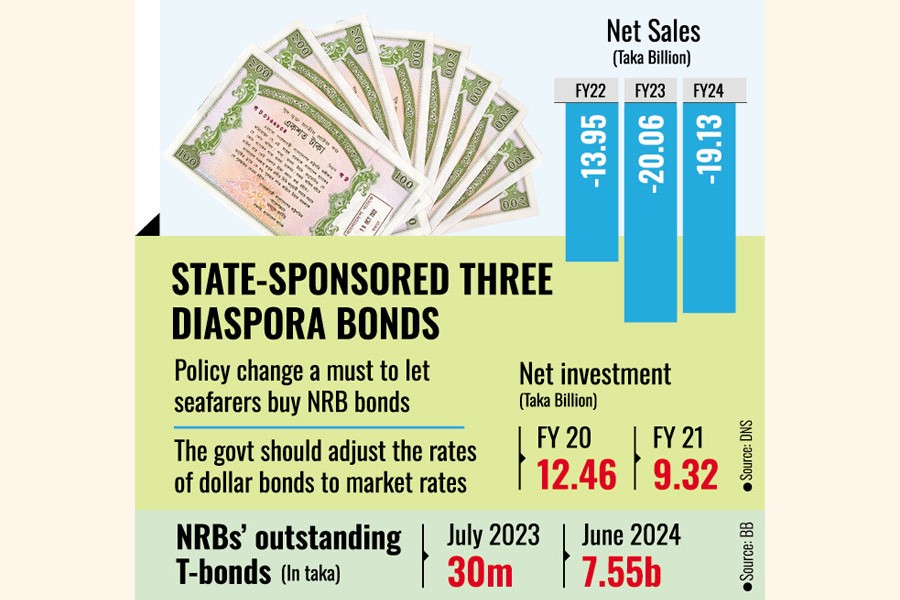
Published :
Updated :

Diaspora bonds of the government have lost attractiveness to expatriates for low profit rates they yield, causing the negative investment growth of the instruments for the past three years.
The negative growth in net sales of the state-backed bonds was Tk 19.13 billion in fiscal year (FY) 2023-24, Tk 20.06 billion in FY23 and Tk 13.95 billion in FY22.
Of the bonds, according to the Department of National Savings (DNS), the Wage Earner Development Bond (WEDB) has a relatively high rate of return.
It has negative growth too, as the largest investor, merchant mariners, cannot invest in this bond due to definition-related complications.
The yield rate of the WEDB is highest at 12 per cent, the US Dollar Premium Bond at 7.50 per cent and the US Dollar Investment Bond at 6.50 per cent.
However, these rates have further been changed into different slabs in January this year, such as above Tk 500,000, the rate is 4.0 per cent for investment bond and 5.0 per cent for premium bond on maturity.
In the case of the WEDB, there will be a profit of 9.0 per cent for above Tk 5.0 million.
Overall investment has dropped for the past two years. Expatriates' net investment on these three bonds was Tk 9.32 billion in FY21 and Tk 12.46 billion in FY20.
The gross sales of the NRB (non-resident Bangladeshi) bonds were Tk 11.06 billion in FY24, Tk 11.72 billion in FY23 and Tk 9.83 billion in FY22.
While sales of diaspora bonds are on the decrease, expatriates' investments in treasury bonds are increasing gradually.
Tareq Muhammad Zakaria, deputy secretary (savings) at the Internal Resources Division (IRD), says expatriates are investing more in treasury bonds.
The NRBs also have better investment options in their destination countries. For these reasons, investment in diaspora bonds is not increasing, he argues.
The government is paying up to a 13-per cent yield on treasury bonds and up to 12 per cent on treasury bills.
Statistics available with the Bangladesh Bank show monthly outstanding treasury bonds held by non-resident investors increased to Tk 7.55 billion in June 2024 from Tk 30 million in July 2023.
DEFINITION COMPLEXITIES
Merchant mariners are the largest customers of the WEDB. So far, they have appealed many times to resume the investment scope. The government has not given any solution to this end yet.
Mariners, also known as seafarers who spend most of their lives on vessels, do not stay long in any country as they have to sail from port to port to perform professional duties.
For this reason, they are not defined as remitters.
Back in 2020, the IRD issued a notification barring merchant mariners from investing in the WEDB, an attractive scheme meant for them for good rates and a death-risk benefit.
For this reason, the sailors, mostly educated and skilled workforce, have invested their hard-earned money abroad since 2020, while their native country faces a depletion of forex reserves.
According to the IMF calculation, the forex reserve currently stands at $20.48 billion as of August 21.
The seafarers, numbering more than 16,000, used to invest in the bond before 2020, says Bangladesh Merchant Marine Officers' Association (BMMOA) president Capt Md Anam Chowdhury.
"An estimated $600 million worth of their total income is now being invested outside of the country each year as they are currently not eligible to invest in the WEDB."
The net negative growth of the WEDB was Tk 14.85 billion in FY24, Tk 16.11 billion in FY23 and Tk 4.15 billion in FY22.
Investment in this bond has fallen for the past two years as well. The net investment was Tk 10.15 billion in FY21 and Tk 11.53 billion in FY20.
BMMOA, the apex trade body of merchant mariners, has sent 12 letters to various government departments since 2020 requesting permission to purchase the wage-earner bond.
They applied to the finance ministry on the 18th of this month.
"About 90-per cent of mariners are employed in contract ships and have no gratuity or pension benefits. The WEDB is the prime investment scheme for their earning source after retirement," cited the letter.
"Therefore, we strongly believe that the resumption of bond purchase facilities for mariners will increase the inflow of foreign exchange in the current critical situation of the country's foreign exchange reserve."
The central bank in a letter also requested the IRD on 24 November 2022 to allow mariners and pilots to buy the bond to boost remittance inflow.
UNWISE POLICY
Economists say it is crucial to take initiatives to increase remittance flow in the country at this critical moment of foreign-exchange reserves.
As Bangladesh has been facing a dollar dearth in recent years, the government should have adjusted the rates of dollar bonds to market rates, they said.
Dr M Masrur Reaz, chairman of the Policy Exchange of Bangladesh, said since the rates of profits in other schemes, including treasury bonds, are high, the rates of NRB bonds should be fixed proportionally.
"Seafarers are earning US dollars, so why can't they buy NRB bonds?" he pointed out, thereby suggesting the government come out of wrong policies, as the country is going through a remittance crisis.
Mr Reaz feels that other remittance earners should also be allowed to invest in NRB bonds to help boost foreign-currency reserves.
Prof Dr Muinul Islam, former chairperson at the Department of Economics at Chattogram University, also suggested allowing sailors to buy the WEDB.
When asked, he said Bangladeshi migrants should primarily be encouraged to remit through formal channels. Then they might be motivated to invest in these bonds as well.
arafataradhaka@gmail.com


 For all latest news, follow The Financial Express Google News channel.
For all latest news, follow The Financial Express Google News channel.